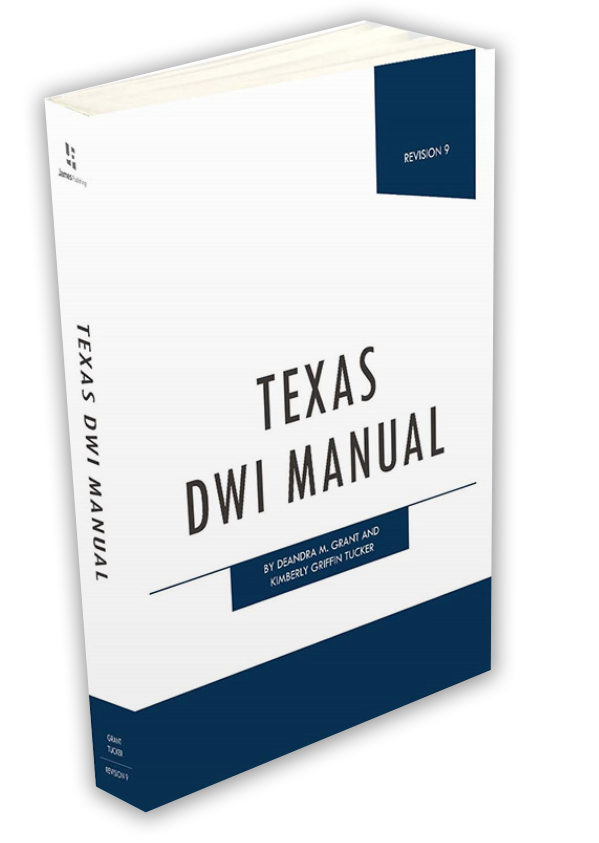Denton DWI and Criminal Defense Lawyers
With Offices in Dallas, Fort Worth, Allen, Denton, Waco & Austin



"Deandra Grant Law fights hard for their clients and is always willing to go above and beyond. They are the best firm for DWI cases in DFW and beyond. Definitely hire them to represent you in any pending cases."

"Deandra Grant made a tough situation so much better. She listened to my concerns and helped me so much with my case. I would recommend her to anyone needing legal services."

"Deandra Grant Law handled my case with diligence and professionalism. Deandra Grant's reputation is stellar and now I know why. She has a team of individuals who provide quality service."





Since 1994 when our doors opened, Deandra Grant Law has helped thousands of clients get their DWI charges reduced or dismissed. We're ready to fight on your behalf.

Managing Partner
Partner & Criminal Division Chief
Criminal Division Senior Associate
Criminal Division DWI Trial Chief
Immigration Division Chief & Criminal Division Deputy Chief
Criminal Division Associate


Fighting DWI charges can present many challenges, not only for the defense, but prosecutors as well. This is why it is important to be armed with the necessary knowledge so you understand the DWI process.
Attorney Deandra M. Grant is the co-author of the Texas DWI Manual, offering legal advice to both clients and fellow attorneys. Fighting DWI charges can present may challenges, not only for the defense, but prosecutors as well. This is why it is important to be armed with the necessary knowledge so that you understand the DWI criminal process.
Learn MoreWelcome to the virtual doorstep of Deandra Grant Law – your trusted source for skilled Denton DWI and Criminal Defense Lawyers. If you find yourself on this page, you might be grappling with a DWI charge or a criminal matter in Denton, TX. It’s natural to feel concerned about the road ahead, but rest assured, you’re not alone. Our empathetic team understands the worries that come with these situations and is here to guide you through the legal intricacies with precision and care.
Facing a DWI charge or a criminal offense can be a daunting experience. The complexities of the legal system can overwhelm even the most composed individuals. That’s where Deandra Grant Law steps in – to provide you with a steadfast and experienced defense.
Our adept legal team possesses a deep understanding of DWI laws in Denton, TX. We cover a wide spectrum of DWI charges, including:
1. BWI (Boating While Intoxicated): Navigating waterways under the influence can lead to serious consequences. We stand by your side to ensure your rights are upheld.
2. CDL DWI (Commercial Driver’s License DWI): Commercial drivers face unique challenges. Trust our expertise to safeguard your livelihood and reputation.
3. Felony DWI: Felony charges amplify the gravity of the situation. We strive to mitigate potential penalties and protect your future.
4. Hit and Run DWI: Accidents happen, but leaving the scene while intoxicated intensifies the legal ramifications. Count on us to construct a robust defense.
5. Multiple DWIs: Repeat DWI offenses can result in harsher consequences. Our experienced lawyers work tirelessly to minimize the impact on your life.
6. Underage DWI: Young individuals deserve a chance to learn from their mistakes. We aim to secure a favorable outcome for their future.
In addition to DWI cases, our firm is well-equipped to tackle a range of criminal defense matters. We have a proven track record of success in cases involving:
1. Drug Crimes: Whether you’re facing possession, distribution, or manufacturing charges, we formulate a strategic defense tailored to your unique circumstances.
2. Murder: The stakes are incredibly high in murder cases. Our meticulous approach and unwavering advocacy ensure your rights are protected.
3. Theft and Robbery: Accusations of theft and robbery can tarnish your reputation. We meticulously examine the evidence to build a strong defense.
4. White-Collar Crimes: Complex financial crimes demand a thorough understanding of intricate laws. Our experienced team unravels the complexities and defends your interests.
At Deandra Grant Law, we comprehend the distress that accompanies DWI and criminal charges. Our approach extends beyond just legal expertise – we provide compassionate guidance to help you weather this storm. Your concerns are our concerns, and your future is our priority.
When you partner with Deandra Grant Law, you’re not merely hiring a legal team – you’re securing a future-focused defense strategy. Our Denton DWI and Criminal Defense Lawyers meticulously analyze every facet of your case, crafting a defense tailored to your specific circumstances. With an unwavering commitment to your rights and well-being, we stand by your side, striving to achieve positive results.
Choosing a criminal defense attorney
Why shouldn’t I use a court ordered attorney
Your rights after a drug crime arrest
Steps to take after a drug crime arrest
How can an attorney help me with a warrant?
Consequences of marijuana possession
How long does a criminal defense case take?
After being arrested for a DWI (Driving While Intoxicated) in Denton, an individual might face a range of charges, each with varying degrees of severity. The specific charges will depend on factors such as the individual’s prior criminal history, the circumstances of the arrest, and whether any aggravating factors were present. Here are some common charges that someone might face after a DWI arrest in Denton:
DWI (Driving While Intoxicated): This is the primary charge for operating a vehicle while under the influence of alcohol or drugs. A DWI charge can be filed as a Class B misdemeanor, Class A misdemeanor, or even a felony, depending on factors like previous DWI convictions and the presence of children in the vehicle.
Intoxication Assault: If an intoxicated driver causes serious bodily injury to another person, they can be charged with intoxication assault, which is a third-degree felony. This charge is applicable when someone sustains significant injuries as a result of the DWI incident.
Intoxication Manslaughter: If an intoxicated driver causes a fatal accident, they can be charged with intoxication manslaughter, which is a second-degree felony. This charge is applicable when someone dies due to the actions of an intoxicated driver.
Child Endangerment: If a person is arrested for DWI while having a child under the age of 15 in the vehicle, they can face additional charges for child endangerment, which can result in enhanced penalties.
Open Container Violation: Having an open container of alcohol in the passenger area of a vehicle can lead to additional charges, even if the driver’s blood alcohol concentration (BAC) is not above the legal limit.
Minor in Possession of Alcohol: If a minor is found to be in possession of alcohol while driving, they can face charges related to underage drinking.
Felony DWI: Certain circumstances can elevate a DWI charge to a felony, such as having two or more previous DWI convictions, causing serious injury or death while intoxicated, or driving with a child passenger while intoxicated.
It’s important to note that the legal consequences and potential penalties for these charges can vary widely. The exact charges and penalties someone might face after a DWI arrest will depend on the specific details of their case and their prior criminal history. This is why it’s crucial to consult with our experienced Denton DWI and criminal defense lawyers who can assess the situation, build a strong defense strategy, and work toward a positive outcome.
If you’ve been arrested, it’s important to remain calm and assert your right to remain silent. You have the right to request an attorney. Avoid making any statements or admissions without your attorney present.
You can post bail by paying the amount set by the court or using a bail bondsman. If you’re unable to post bail, you may have a bail hearing where the court will determine the conditions of your release.
You have the right to remain silent, the right to an attorney, and the right to a fair and speedy trial. It’s important to exercise these rights and not provide information without consulting an attorney.
Booking involves recording your personal information, taking fingerprints and photographs, and conducting a background check. You’ll be informed of the charges against you and your rights.
In most cases, you must be brought before a judge within 48 hours of arrest. However, holidays and weekends might extend this period. The judge will inform you of the charges and set bail conditions.
It’s generally advisable not to speak to the police without an attorney present. Anything you say can be used against you, and an attorney can help protect your rights and guide your interactions with law enforcement.
An attorney can provide legal advice, help navigate the legal process, and build a strong defense strategy. They can ensure your rights are protected, negotiate with prosecutors, and work to achieve a positive outcome.
The consequences can vary greatly depending on the nature of the charges and your criminal history. They might include fines, probation, community service, jail time, or more serious penalties for felony charges.
Yes, if you’re charged with a crime, you’ll generally have to appear in court. Your attorney will guide you through the court process and represent you during hearings and trial if necessary.
Texas law allows for certain offenses to be expunged or sealed from your record under specific circumstances. Consulting an attorney can help you understand if you’re eligible for record sealing or expungement.
The charges someone might face after being arrested for a crime in Denton can vary widely based on the nature of the offense, the circumstances surrounding the arrest, the individual’s criminal history, and the severity of the crime. Here are some common charges that someone might face after being arrested for a crime in Denton:
Assault: Depending on the severity of the altercation and whether a weapon was involved, charges can range from simple assault (Class C misdemeanor) to aggravated assault (ranging from second-degree felony to first-degree felony).
Theft: Charges for theft can range from Class C misdemeanor for low-value theft to felony charges for more serious cases, such as theft of property valued over a certain threshold.
Burglary: Depending on whether the intent was to commit theft or another felony inside a structure, charges can range from state jail felony to first-degree felony.
Robbery: Taking property from a person using force or threat of force can lead to charges of robbery, which can range from second-degree felony to first-degree felony.
Drug Possession: Charges for drug possession can vary based on the type and amount of the controlled substance, ranging from Class B misdemeanor to felony charges.
Drug Trafficking or Distribution: Charges can range from third-degree felony to first-degree felony, depending on the quantity and type of drugs involved.
Homicide: Depending on the intent and circumstances, charges can include manslaughter (ranging from second-degree felony to state jail felony) or murder (ranging from first-degree felony to capital felony).
Sexual Offenses: Charges can include sexual assault (second-degree felony or higher), indecent exposure (Class B misdemeanor), and various other offenses depending on the nature of the act and the victim’s age.
Fraud and White-Collar Crimes: Charges can include various types of fraud, embezzlement, forgery, and identity theft, with penalties ranging from misdemeanors to felonies depending on the severity.
Domestic Violence: Charges can include assault, aggravated assault, or other related offenses, depending on the nature of the altercation and the relationship between the parties involved.
It’s important to remember that the charges an individual might face will depend on the specific circumstances of the case. Legal penalties can vary significantly based on the type of crime, the evidence presented, the defendant’s criminal history, and other factors. If you or someone you know has been arrested for a crime in Denton, it’s crucial to seek the assistance of our experienced Denton DWI and criminal defense lawyers who can provide guidance and work to build a strong defense strategy tailored to the specific situation.
If you’re facing the overwhelming aftermath of a DWI charge or a criminal offense in Denton, TX, Deandra Grant Law is here to be your guiding light through the legal labyrinth. We understand the uncertainty that clouds your mind, and we’re committed to helping you find clarity and resolution.
Taking the first step can be the hardest, but it’s crucial. Contact us now for a free consultation to discuss the specifics of your case. Our experienced legal team of Denton DWI and criminal defense lawyers are eager to listen, understand, and strategize to devise the best approach for your defense. Your story matters, and we’re here to ensure it’s heard.
At Deandra Grant Law, we believe that everyone deserves a chance for redemption. We’re more than just lawyers; we’re your advocates, your support, and your partners in pursuing justice. Our dedication to your well-being drives us to work tirelessly to achieve a positive outcome for your case. Your future is our priority, and we’re committed to securing it.
Arming yourself with knowledge is a powerful tool. By reaching out to Deandra Grant Law, you’re taking a proactive step toward safeguarding your rights and future. Don’t let uncertainty and fear dictate your journey – let our expertise pave the way toward resolution.
Your story is unique, and so is the defense you deserve. If you’re ready to face the challenges ahead with a seasoned legal team by your side, don’t hesitate to get in touch. Call us today for a free consultation. We’ll be your advocates, your advisors, and your allies on the path to justice.
![]()
“Deandra Grant Law handled my case with diligence and professionalism. Deandra Grant’s reputation is stellar and now I know why. She has a team of individuals who provide quality service.”